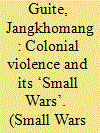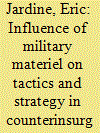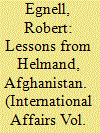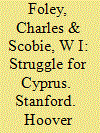|
|
|
Sort Order |
|
|
|
Items / Page
|
|
|
|
|
|
|
| Srl | Item |
| 1 |
ID:
165199


|
|
|
|
|
| Summary/Abstract |
This paper concerns the lesser known British counterinsurgency (COIN) operations in Northeast frontier of India during the First World War. Officially known as the ‘Kuki Operations’, it was considered as part of the Great War. Carried out in isolation from press and public, and shelved in colonial archives, the event remained invisible until today. Yet, it registers a critical case of colonial COIN doctrine where the ‘moral effect’ doctrine was employed without being questioned. It unleashed enormous amount of organized violence, ranging from shoot at sight to indiscriminate burning of villages, wholesale destruction of property and livestock, prevention of cultivation and rebuilding of villages, forced mass displacement in jungles or in ‘concentration camps’, and collective punishment (communal penal labour and payment of compensation) after the war. This paper argues that the theory of ‘minimum force’ and the practicability of the ‘moral effect’ doctrine as applied by the Empire, sit oddly with each other at the frontier, where violence was seen both as a natural and moral orders. Violence as an ‘imperatively necessary’ method to bring order in a disorderly frontier, in the opinion of colonial state, informs and registers Northeast India as geography of violence.
|
|
|
|
|
|
|
|
|
|
|
|
|
|
|
|
| 2 |
ID:
110080


|
|
|
|
|
| Publication |
2011.
|
| Summary/Abstract |
This paper presents an analysis of the multiple effects of greater military materiel and troop quantities on the conduct of counterinsurgency. Although counterinsurgency is often considered a manpower intensive form of warfare, this paper posits that several dangers are inherent in the provision of more troops to the waging of such campaigns. Using the British counterinsurgency in Malaya as an illustrative, inductive case study, this article argues that greater materiel strength distorts the counterinsurgency's tactical and operational efforts, which can then dislocate their strategic plans.
|
|
|
|
|
|
|
|
|
|
|
|
|
|
|
|
| 3 |
ID:
103294


|
|
|
|
|
| Publication |
2011.
|
| Summary/Abstract |
This article analyses the conduct of British operations in Helmand between 2006 and 2010 and discusses the implications for the legacy and future of British counterinsurgency. A number of lessons stand out: first, competence in the field of counterinsurgency is neither natural nor innate through regimental tradition or historical experience. The slow adaptation in Helmand-despite the opportunity to allow the Basra experience to be a leading example of the need for serious changes in training and mindset-is an indication that the expertise British forces developed in past operations is but a distant folktale within the British Armed Forces. Substantially changed training, painful relearning of counterinsurgency principles and changed mindsets are therefore necessary to avoid repeated early failures in the future. Moreover, despite eventually adapting tactically to the situation and task in Helmand, the British Armed Forces proved inadequate in dealing with the task assigned to them for two key reasons. First, the resources of the British military are simply too small for dealing with large-scale complex engagements such as those in Helmand or southern Iraq. Second, the over-arching comprehensive approach, and especially the civilian lines of operations that underpinned Britain's historical successes with counterinsurgency, are today missing.
|
|
|
|
|
|
|
|
|
|
|
|
|
|
|
|
| 4 |
ID:
099857


|
|
|
|
|
| Publication |
2010.
|
| Summary/Abstract |
With strategic success in Iraq and Afghanistan far from certain, comforting beliefs about Britain's superiority at counterinsurgency have come under increasingly sceptical scrutiny. This article contributes to the debate with particular reference to the supposedly pivotal principle of minimum force. After discussing the recent literature on the subject, the article critiques the methodology employed by advocates of the traditionalist view on British COIN, arguing for a more rigorous historical approach based on primary sources. Following these historical matters, it is argued that conceptually, minimum force should be analysed dialectically in relation to practices of exemplary force, and above all, on the evidence of what happens in a conflict. Arguably the value ascribed to doctrine in strategic analysis has become unduly inflated, and we must look beyond it to understand war and political violence.
|
|
|
|
|
|
|
|
|
|
|
|
|
|
|
|
| 5 |
ID:
028393


|
|
|
|
|
| Publication |
Stanford, Hoover Institution Press, 1975.
|
| Description |
x, 193p.hbk
|
| Series |
Stanford University. Hoover Institution on War, Revolution, and Peace. Publication; 137
|
| Standard Number |
0817913718
|
|
|
|
|
|
|
|
|
|
|
|
Copies: C:1/I:0,R:0,Q:0
Circulation
| Accession# | Call# | Current Location | Status | Policy | Location |
| 015719 | 956.4503/FOL 015719 | Main | On Shelf | General | |
|
|
|
|
|
|
|
|
|